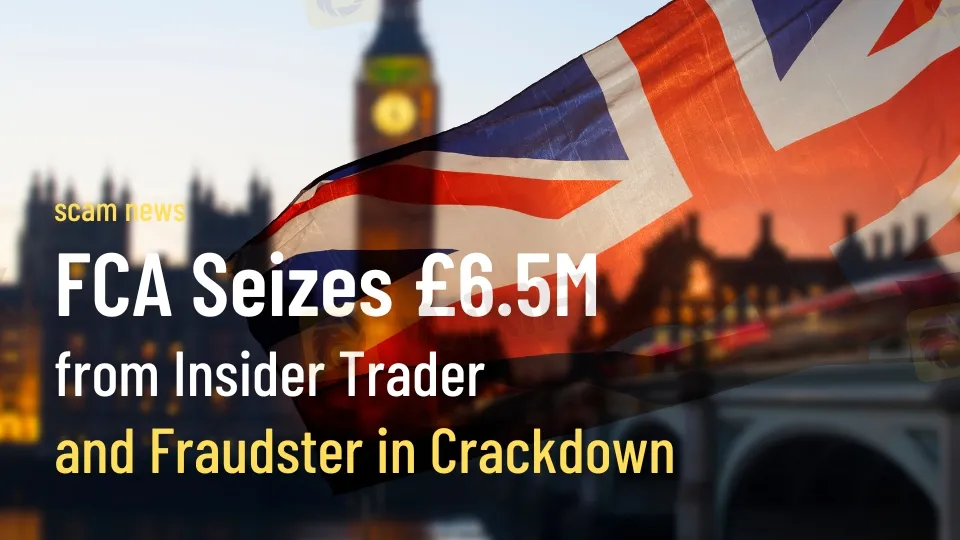简体中文
繁體中文
English
Pусский
日本語
ภาษาไทย
Tiếng Việt
Bahasa Indonesia
Español
हिन्दी
Filippiiniläinen
Français
Deutsch
Português
Türkçe
한국어
العربية
FCA Seizes £6.5M from Insider Trader and Fraudster in Crackdown
Abstract:UK FCA confiscates £6.5M from insider trader and investment scammer, reinforcing commitment to combat financial crime and protect market integrity.

The UK Financial Conduct Authority (FCA) has achieved substantial progress in combating financial crime, obtaining more than £6.5 million through two large confiscation judgments. The regulator's measures, which target a convicted insider trader and a fraudulent investment scheme operator, highlight its commitment to ensuring that criminality does not pay.
In the first instance, the FCA obtained a confiscation order of £586,711.01 for Mohammed Zina, a former Goldman Sachs analyst convicted of insider trading in 2023. Zina, who has been sentenced to 22 months in jail, must pay the whole sum within three months or risk an extra five years in prison. Zina traded equities based on non-public knowledge of planned mergers and acquisitions between 2016 and 2017, leveraging insider information obtained through his employment at Goldman Sachs' Conflicts Resolutions Group. His illicit operations generated roughly £140,486 in profits and were partially funded by £95,000 in illegally obtained Tesco Bank loans.
Zina's entire criminal benefit, adjusted for inflation, was set at £1.09 million by the court. However, the confiscation ruling only applies to his existing accessible assets. Insider trading took place in the following stocks: Arm Holdings plc, Alternative Networks plc, Punch Taverns plc, Shawbrook plc, HSN Inc, and Snyder's Lance Inc.
Therese Chambers, Joint Executive Director of Enforcement and Market Oversight at the FCA underscored the regulator's zero-tolerance approach: “Insider dealing undermines the integrity of our markets. In addition to pursuing insider sellers, we will not allow them to retain any of their criminal earnings. We have taken all of Mr Zina's assets, proving that criminality does not pay.”

In the second instance, the FCA obtained a £5,963,376.15 confiscation order from Guy Flintham, a convicted fraudster who engineered a £19 million investment scheme. Flintham, who is presently serving a six-year jail sentence, misled more than 240 investors by fraudulently exaggerating the profitability and functioning of his investment plan. He even made up paperwork to preserve the appearance of achievement.
The court determined Flintham's overall criminal profit to be £23.93 million, however, the confiscation order only applies to his already accessible assets. The cash recovered will be given to the scam victims. Flintham has three months to pay the money or risk another two years in jail.
According to Steve Smart, Joint Executive Director of Enforcement and Market Oversight at the FCA, “Mr Flintham deliberately lied and misled people, causing them serious harm.” This order sends a message to everyone who commits fraud: your ill-gotten wealth are not protected even if you're behind prison.
The FCA is currently seeking to contact Flintham's victims in order to secure compensation. These proceedings demonstrate the regulator's commitment to safeguarding market integrity and investors from financial wrongdoing. The FCA seeks to discourage future misbehavior and uphold justice by seizing illegal earnings and bringing criminals accountable.
These enforcement proceedings are part of the FCA's overall strategy to combat financial crime and restore confidence in the UK's financial markets. The regulator is still prioritizing the prosecution of insider trading and fraudulent schemes, delivering a strong message that such behavior will not be allowed.
The FCA's efforts to collect and redistribute cash to victims show its dedication to resolving the suffering caused by financial crimes. As the regulator improves its enforcement powers, it is committed to providing a fair and transparent financial environment for all players.
To summarize, the FCA's recent confiscation judgments against Mohammed Zina and Guy Flintham are an important win in the battle against financial crime. The regulator has reaffirmed its view that crime does not pay by seizing over £6.5 million in unlawful proceeds, as well as making reparations to victims. These measures serve as a clear reminder to anyone who engage in fraudulent behavior, highlighting the FCA's unrelenting commitment to safeguarding the integrity of the financial markets.

Disclaimer:
The views in this article only represent the author's personal views, and do not constitute investment advice on this platform. This platform does not guarantee the accuracy, completeness and timeliness of the information in the article, and will not be liable for any loss caused by the use of or reliance on the information in the article.
Read more

Never Heard of Dynasty Trade? Here's Why You Should Be Worried
Have you heard this name before? No , it’s time you do because staying unaware could cost you. This platform is currently active in the forex trading and has been linked to several suspicious activities. Even if you’ve never dealt with it directly, there’s a chance it could reach out to you through ads, calls, messages, or social media. That’s why it’s important to know the red flags in advance.

Want to Deposit in the EVM Prime Platform? Stop Before You Lose It ALL
Contemplating forex investments in the EVM Prime platform? Think again! We empathize with those who have been bearing losses after losses with EVM Prime. We don't want you to be its next victim. Read this story that has investor complaints about EVM Prime.

WEEKLY SCAM BROKERS LIST IS OUT! Check it now
If you missed this week's fraud brokers list and are finding it difficult to track them one by one — don’t worry! We’ve brought together all the scam brokers you need to avoid, all in one place. Check this list now to stay alert and protect yourself from fraudulent brokers.

Catch the Latest Update on BotBro & Lavish Chaudhary
BotBro, an AI-based trading platform, became popular in India in 2024—but for negative reasons. Its founder, Lavish Chaudhary, who gained a huge following by promoting it heavily on social media. Since then, he has become well-known, but for many controversies. Let’s know the latest update about Botbro & Lavish Chaudhary.
WikiFX Broker
Latest News
RM750 Million Lost to Investment Scams in Just Six Months
5 things to know before the Thursday open: Meme stock revival, Trump's Fed visit, Uber's gender feature
Why Octa Is the Ideal Broker for MetaTrader 4 & 5 Users
CNBC's Inside India newsletter: Leaving, but not letting go — India's wealthy move abroad, but stay invested
Moncler raises prices on tariffs, may postpone store openings if downturn worsens
Titan FX Adds WhatsApp and Telegram for Enhanced Support
Nestle flags further potential price hikes as tariffs, commodities weigh on margins
Stop Level Forex: How Does it Help Traders Prevail When Losses Mount?
eToro Launches Spot-Quoted Futures Trading in Spain
Titan FX Introduces Redesigned Client Cabinet for Enhanced Usability
Currency Calculator


